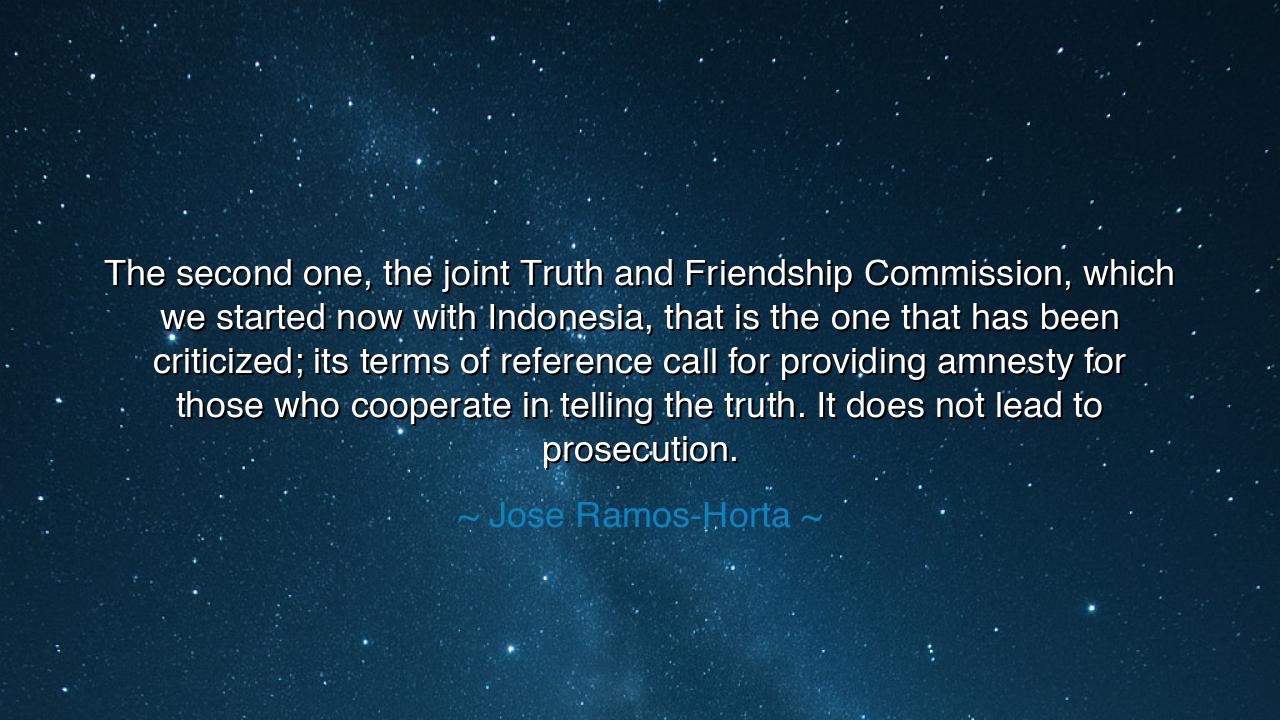
The second one, the joint Truth and Friendship Commission, which
The second one, the joint Truth and Friendship Commission, which we started now with Indonesia, that is the one that has been criticized; its terms of reference call for providing amnesty for those who cooperate in telling the truth. It does not lead to prosecution.






In the words of José Ramos-Horta, a man forged in the long struggle of East Timor’s liberation, we find a reflection of humanity’s eternal conflict between justice and forgiveness. When he spoke of “the joint Truth and Friendship Commission … whose terms of reference call for providing amnesty for those who cooperate in telling the truth”, he was not merely describing a political mechanism; he was invoking the ancient dilemma of whether truth alone can heal a nation’s soul, or whether punishment must also be demanded to balance the scales of moral order. In his voice echoes the weary wisdom of one who has seen both vengeance and mercy tear through the same land, and knows that neither alone can restore harmony.
This Commission between East Timor and Indonesia was born out of blood and ashes — an attempt to bind together two peoples once sundered by violence. After the occupation, when the cries of the slain still lingered in the hills and the memories of oppression burned in the hearts of the survivors, there arose a need not only for justice but for peace. Ramos-Horta understood that the truth must be spoken, yet if every truth summoned retribution, no voice would dare emerge from the silence. Thus he spoke of a path where those who confessed would find amnesty, not as an escape from guilt, but as a bridge toward reconciliation. This, he knew, was no easy road — for it asked the living to forgive where their hearts still bled.
Throughout the ages, great civilizations have faced this same trial. Consider the story of South Africa, where Nelson Mandela and Desmond Tutu established the Truth and Reconciliation Commission. There too, those who laid bare their crimes were spared the sword of prosecution. Many criticized this — they said it mocked justice, that it allowed monsters to walk free. But others saw in it the flicker of a greater light: the chance for a nation to cleanse itself not through punishment, but through truth and contrition. There is power in the spoken confession — it is a laying down of arms, a disarming of the spirit. To speak the truth of one’s deeds, when silence would protect the self, is to begin the work of healing.
Yet one must not mistake forgiveness for forgetting. What Ramos-Horta proposed was not an erasure of the past, but a way to face it without destroying the future. Like a wounded body, a nation must let its scar form — not as denial, but as remembrance. In ancient times, the wise would say: “He who avenges his brother’s blood binds his soul to the same suffering.” Retribution perpetuates the chain, each act echoing into the next. But truth — truth that is spoken freely, with courage and humility — breaks the chain. It returns humanity to both the wrongdoer and the wronged.
The emotional weight of this idea is immense. Imagine a mother, who lost her son in war, sitting across from the man who took his life. The court of vengeance would demand his death; the court of truth would demand his honesty. If he speaks, if he tells her of that day, if he confesses his fear, his cruelty, his regret — perhaps the tears that follow will cleanse both souls. This does not erase the pain, but transforms it. It becomes a shared sorrow instead of an unending hatred. That, my child, is the sacred alchemy of truth and friendship.
The critics, in their reason, are not wrong — amnesty can seem unjust. But Ramos-Horta’s wisdom lies deeper than law. He sought not the justice of the court, but the justice of the heart. A nation cannot live forever with the sword in its hand. To rebuild, it must learn to forgive without forgetting, to seek truth without vengeance, and to embrace its former enemies as fellow sufferers in the same human tragedy. This is not weakness. It is the highest form of strength.
And so, the lesson passes to us. When we are wronged — in life, in love, in the daily wars of our own hearts — we too must choose. Shall we demand punishment, or shall we demand truth? Let us follow Ramos-Horta’s path and seek truth with courage, forgive with dignity, and build friendship upon the ruins of pain. In our own lives, let us listen before judging, speak before resenting, and when possible, extend the hand of peace. For only in doing so do we become truly free — and the light of truth will shine not only upon our enemies, but upon ourselves.






AAdministratorAdministrator
Welcome, honored guests. Please leave a comment, we will respond soon